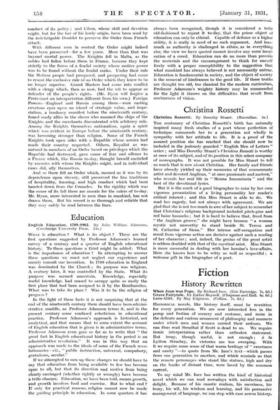Education
English Education, 1789-1902. By John William Adamson. (Cambridge University Press. 21s.) English Education, 1789-1902. By John William Adamson. (Cambridge University Press. 21s.)
WHAT is education ? What is its object ? These are the first questions suggested by Professor Adamson's learned survey of a century and a quarter of English educational history. To these questions a third might be added : What is the importance of education ? In attempting to answer these questions we must not neglect our experience and merely consult our invention. In 1789 education in England was dominated by the Church ; its purpose was religious. A century later, it was controlled by the State. What its purpose was seemed uncertain. Knowledge, especially useful knowledge, had ceased to occupy quite so easily the first place that had been assigned to it by the Benthamites; What was to take its place ? Was it to be the religion of progress ?
In the light of these facts it is not surprising that at the end of the nineteenth century there should have been admini- strative muddle, as Professor Adamson terms it, and in the present century some confused eclecticism in educational practice. Professor Adamson's approach is historical, not analytical, and that means that to some extent the account of English education that is given is in administrative terms. Professor Adamson even goes so far as to write that " the great fact in English educational history in the period is an administrative revolution." It was in this way that an approach was made to the ideals of some of the French revo- lutionaries—vfz., " public instruction, universal, compulsory, gratuitous, secular."
If we attempted to sum up these changes we should have to say that education from being available to few has become Open to all, but that its direction and motive from being clearly envisaged (whether rightly or wrongly) have become a trifle obscure. Education, we have been told, means growth; and growth involves food and exercise. But to what end ? If only for practical reasons, religion cannot now be made the guiding principle in education. In some quarters it hai
always been recognized, though it is considered a trifle old-fashioned to repeat it to-day, that the prime object of education can only be ethical. Capable of defence as a higher utility, it is really in need of no such argument. And inas- much as authority is challenged in ethics, as in everything else, the view we have quoted cannot involve any mere incul- cation of a creed. Education can do no more than provide the materials and the encouragement to think for oneself freely with a proper susceptibility to the suggestion that what mankind has always believed is not necessarily untrue. Education is fundamental in society, and the object of society is the removal of hindrances to the good life. If these truths arc thought too old, too classical for the modern curriculum, Professor Adamson's weighty history may be commended for the light it throws on the difficulties that result from unclearness of vision.






































 Previous page
Previous page